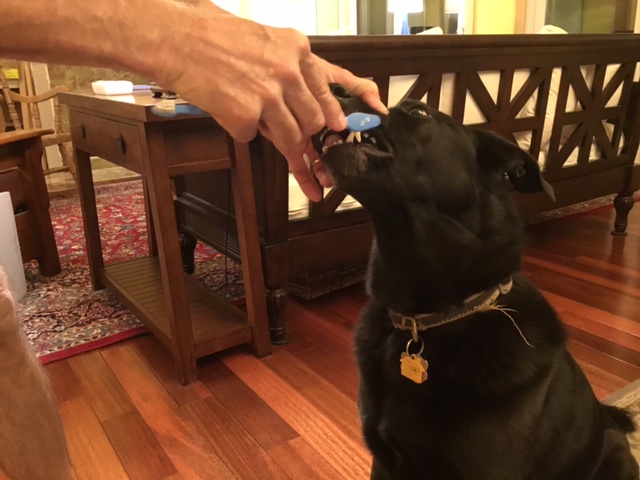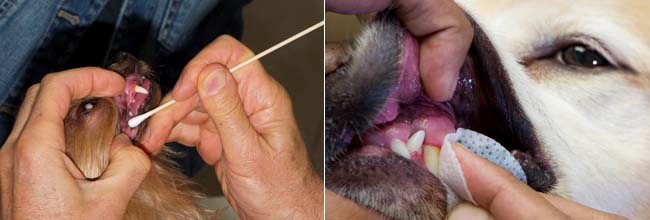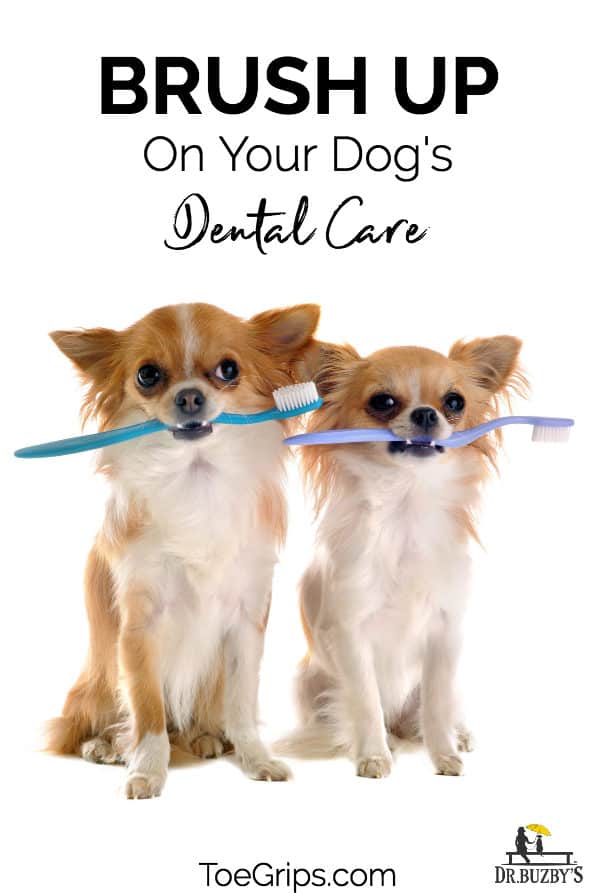 |
Should I Brush My Dog’s Teeth? 7 Tips and a Helpful How-to Video
By Wayne Lilley and Zeppo, a dog who learned to love toothbrushing
“Should I brush my dog’s teeth?” If you’re debating whether a toothbrushing regimen is important (or even necessary) for your dog, please look to Zeppo for the answer. My dog will proudly show you his pearly whites! Zeppo excels in the “white teeth” department! It turns out that good old-fashioned tooth brushing was the dental care answer for our canine companion—as is the case for most dogs.
However, since very few dogs are known to have brushed their own teeth, we need to help them!
Should I brush my dog’s teeth? A life lesson that I learned the hard way
Years ago, my wife and I learned the importance of dental care for our dog the hard way. It was a sad day when our vet described our elderly dog’s teeth as beyond hope and possibly painful to him. From that difficult life lesson with our beloved senior dog, we resolved to start young Zeppo on a toothbrushing regimen at an early age. We made it part of our daily routine and faithfully brushed Zeppo’s teeth each day at bedtime. Now, Zeppo loves the taste of the poultry-flavored dog toothpaste and he enjoys the daily toothbrushing routine.
Seven dental care tips for brushing your dog’s teeth
If you are ready to brush up on your dog’s dental care, here are seven toothbrushing tips shared by Dr. Jan Bellows, owner of All Pets Dental in Weston, Florida. Additionally, Dr. Bellows is a consultant on the Veterinary Information Network and a mentor to Dr. Julie Buzby.
1. What should I use to brush my dog’s teeth?
The key to brushing your dog’s teeth is to get coverage and friction. To do this, you may choose to brush your dog’s teeth with a toothbrush or a pet dental cleansing pad. Even plain gauze or Q-Tips are effective. Dr. Bellows prefers pet dental brushing pads, which provide a good source of friction. In deciding which tool to use for brushing your own dog’s teeth, select the one that is most comfortable for both you and for your dog. Remember, the key to success is both friction and frequency.

2. What type of paste should I use to brush my dog’s teeth?
You should choose a pet-safe toothpaste that is formulated for dogs. Most pet stores carry dog toothpaste or you can check with your veterinarian. While dog toothpaste is often “enzymatic,” Dr. Bellows knows of no proof that this type of toothpaste is more effective. While the flavor of the toothpaste itself (Zeppo likes poultry flavor) helps your dog tolerate the brushing experience, it is the mechanical action of brushing that produces 95% or more of the results.
3. Can I use human toothpaste to brush my dog’s teeth?
DO NOT use human toothpaste to brush your dog’s teeth. Most kinds of toothpaste formulated for humans contain fluoride in high enough concentrations that, if swallowed daily, would be toxic to your dog. (Human toothpaste is not intended to be swallowed by anyone—humans or pets.) Additionally, human toothpaste may also contain Xylitol, a sugar substitute that is a dangerous and life-threatening toxin for dogs.
IMPORTANT ALERT ABOUT HUMAN TOOTHPASTE:
DO NOT use human toothpaste to brush your dog’s teeth. It may contain substances which are toxic to dogs, including Xylitol.
Dogs will ingest toothpaste during toothbrushing.
4. How often should I brush my dog’s teeth?
It is ideal to brush your dog’s teeth two times daily after meals. One time a day is good. Two times per week is the absolute minimum to have any proven benefit. Also, keeping a routine is important to dogs. Tooth brushing is best done at the same time each day.
5. Which teeth should I brush?
Brush only the outside of your dog’s teeth. Brushing inside and/or the biting surfaces will not hurt, but is unnecessary as unwanted plaque buildup in these areas is unusual.
6. How long should brushing my dog’s teeth take?
Brush the outside surfaces of all teeth until you have brushed, wiped, or somehow applied a little friction on all of them. Typically, the process takes one minute or so.
7. What if brushing isn’t enough?
When all else fails and you can’t make brushing work or brushing is not enough, a water additive can help. The Vet Oral Health Council recommends dog::ESSENTIAL healthymouth™ anti-plaque water additive.
What else can I do to keep my dog’s teeth healthy?
In addition to establishing a daily toothbrushing routine, Dr. Bellows shared the following important message about your dog’s dental care:
“Avoid hard treats! Anything which is not flexible and a little bit soft does not belong in a dog’s mouth. Hard dog treats break teeth!”Click To TweetOuch…I just threw away a few of Zeppo’s toys! Sorry, Zep!
Finally, there is a side benefit of regular brushing! Your dog’s oral exams, whether at home or are at the vet, are easier and more comfortable for him or her. Our at-home preventive care routine for Zeppo means his vet visits are easier, too!
Please watch this video of Zeppo demonstrating proper toothbrushing techniques:
Today, Zeppo loves brushing and will not go to bed without this important (and tasty!) part of his routine. It was not always easy, so we are happy to share our techniques with you!
Do you brush your dog’s teeth?
We’d love to hear. Please comment below.



I began brushing my Aussie’s teeth at a very early age. To compliment the once-daily brushing l finish with a dental gel application which she truly enjoys. Approaching her 14th birthday In December, she has had zero issues with tooth/gum related problems. With her twice yearly wellness exams her veterinarian never fails to comment on her exceptional oral health. So l am in total agreement that good oral health is essential to your pet’s wellbeing.
Hi Ronald,
Amazing! Your girl is very lucky to have you taking such good care of her. Thanks for sharing your experience with us. Best wishes and keep up the good work!
I don’t brush their teeth but I will after seeing this. I don’t know why this didn’t occur to me to try this. I uses to train horses, you always start with introduction of equipment in a fun way. we will begin this tonight. thank you.
Hi Bonnie,
Thank you for the great feedback about the article. I am glad it was eye opening and informative. Best of luck to you and yours!
Thank you for sharing such valuable tips on how to brush our dogs’ teeth effectively. Just like humans, it’s important to make it a daily routine to ensure proper dental hygiene for our furry friends. Additionally, it’s recommended to consult with a dog dentist to determine which dental products are most suitable for our dogs.
My yorkie is 14yrs old. I just found out that she has a loose tooth, my husband say it will fall it’s own. But I rather take her to a vet being taking care of the tooth. Just to be in the safe side. I try my best to brush her teeth but sometimes I forget.
Hi Jody,
I agree it would be best to have the tooth evaluated by your veterinarian. They may need to do dental x-rays to know for sure if the tooth needs to be extracted. Dental disease can be quite painful so it should always be addressed sooner rather than later. I commend you for taking time to brush your dog’s teeth! Hoping you get good news from your vet and the issue can easily be resolved.
Great and very helpful information! Loved watching Zeppo
Thanks, Cyndi! You win the award for the most faithful and supportive blog reader! We are so happy that you find our blogs helpful. We appreciate you!
Question: If my dog already has some plaque build-up, will regular brushing bring that down? Can we reverse a poor dental situation?
Thank you! And thanks for the video!
Hi Alyssa, Unfortunately it’s not possible to brush off the visible tartar on your dog’s teeth, which is like “cement”, but it is always possible to brush off plaque. But it is always a good thing to start a regular brushing routine, because it can help prevent progression and will also be a great place to start after your dog has professional dental care. You can reverse a poor dental situation, but it may require professional intervention by your veterinarian (and possibly even extractions). It depends on your definition of “poor”. I would start by having your veterinarian examine your dog’s mouth and make recommendations. But please be encouraged because it’s never too late to help your dog in this way and make significant strides in keeping his/her mouth healthy in the long term. Home dental care is truly one of the most important things you can do at home to better your dog’s health. Thanks for the great question! 🙂